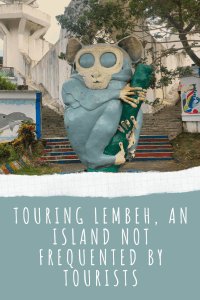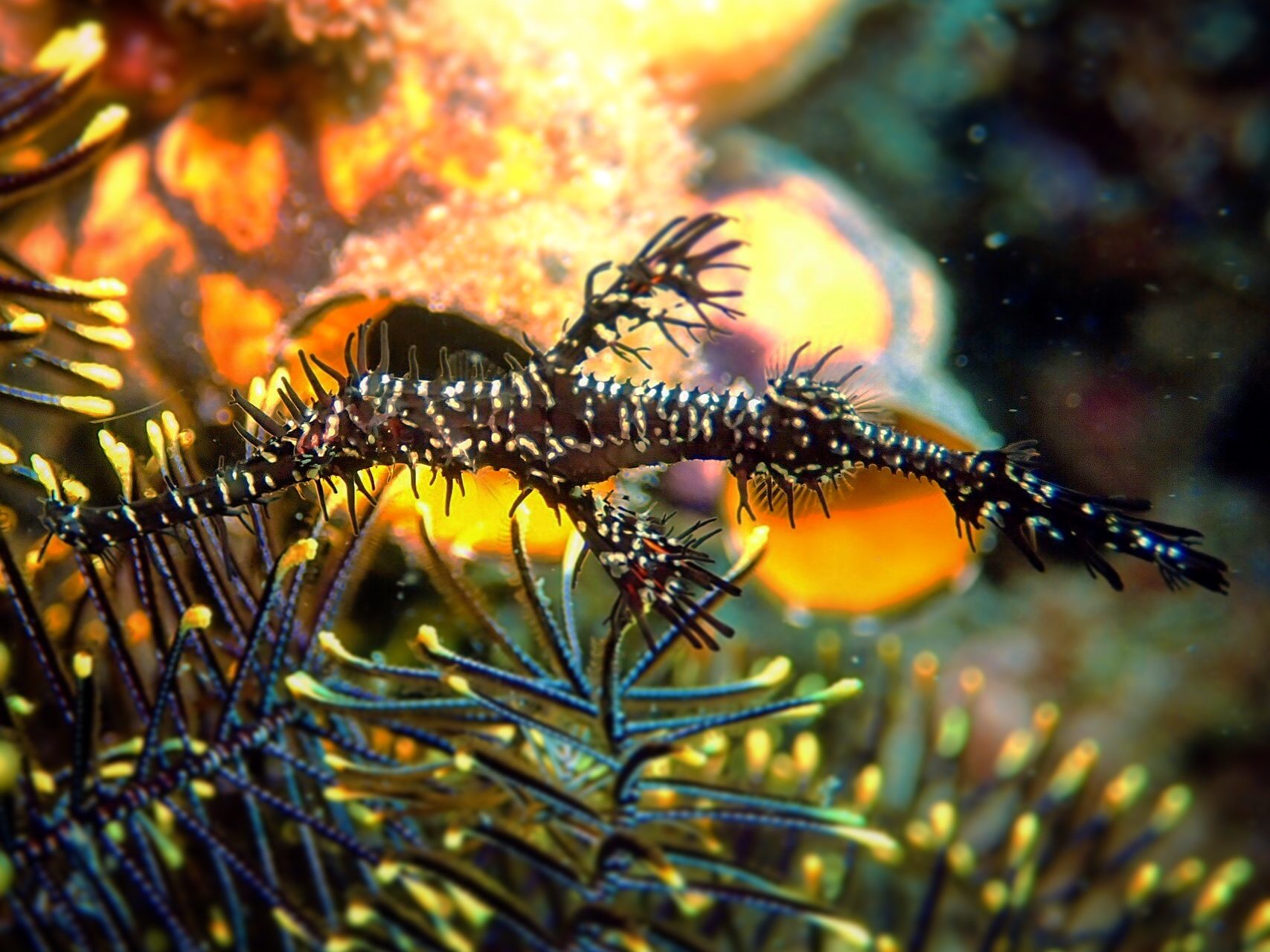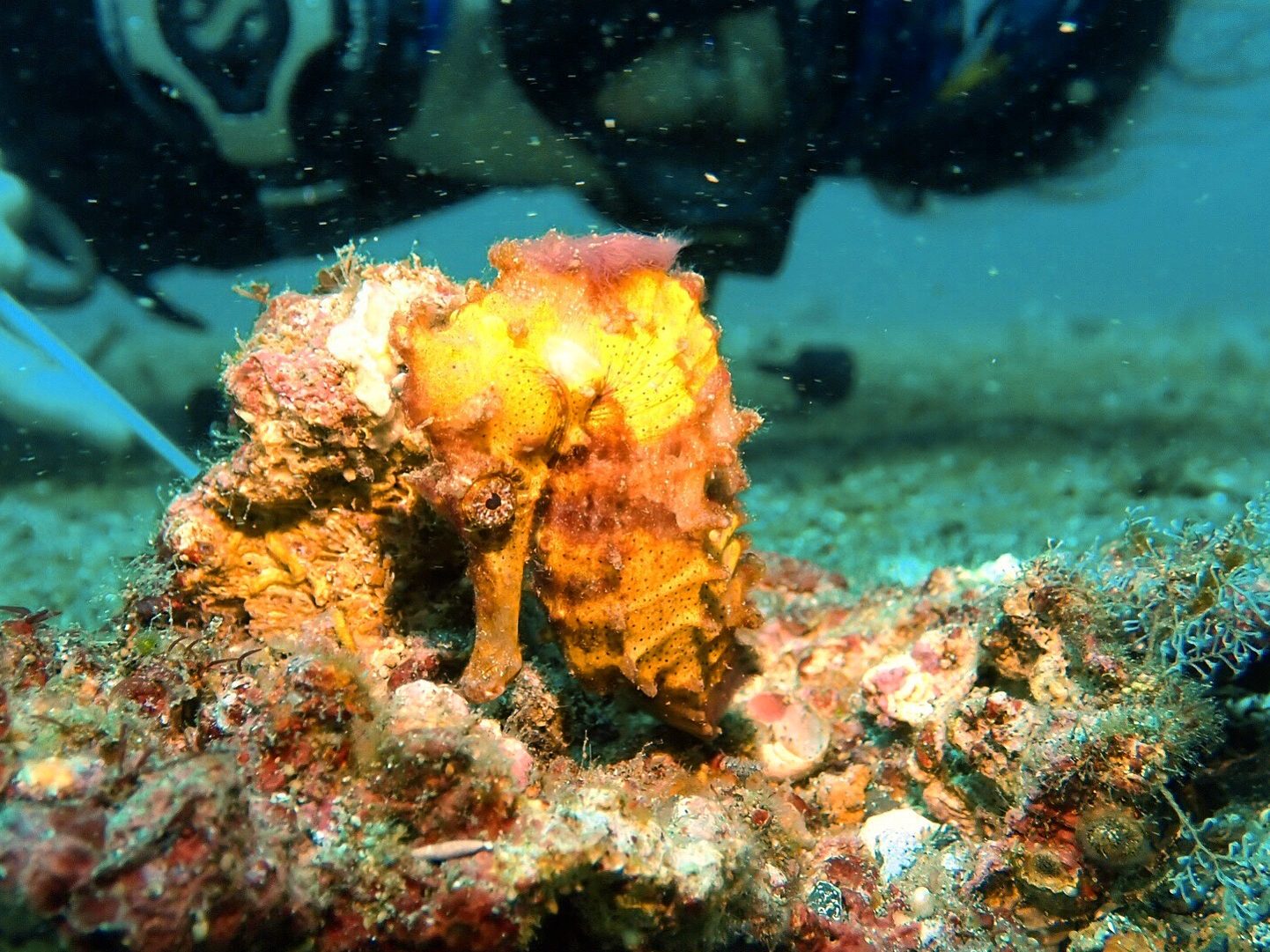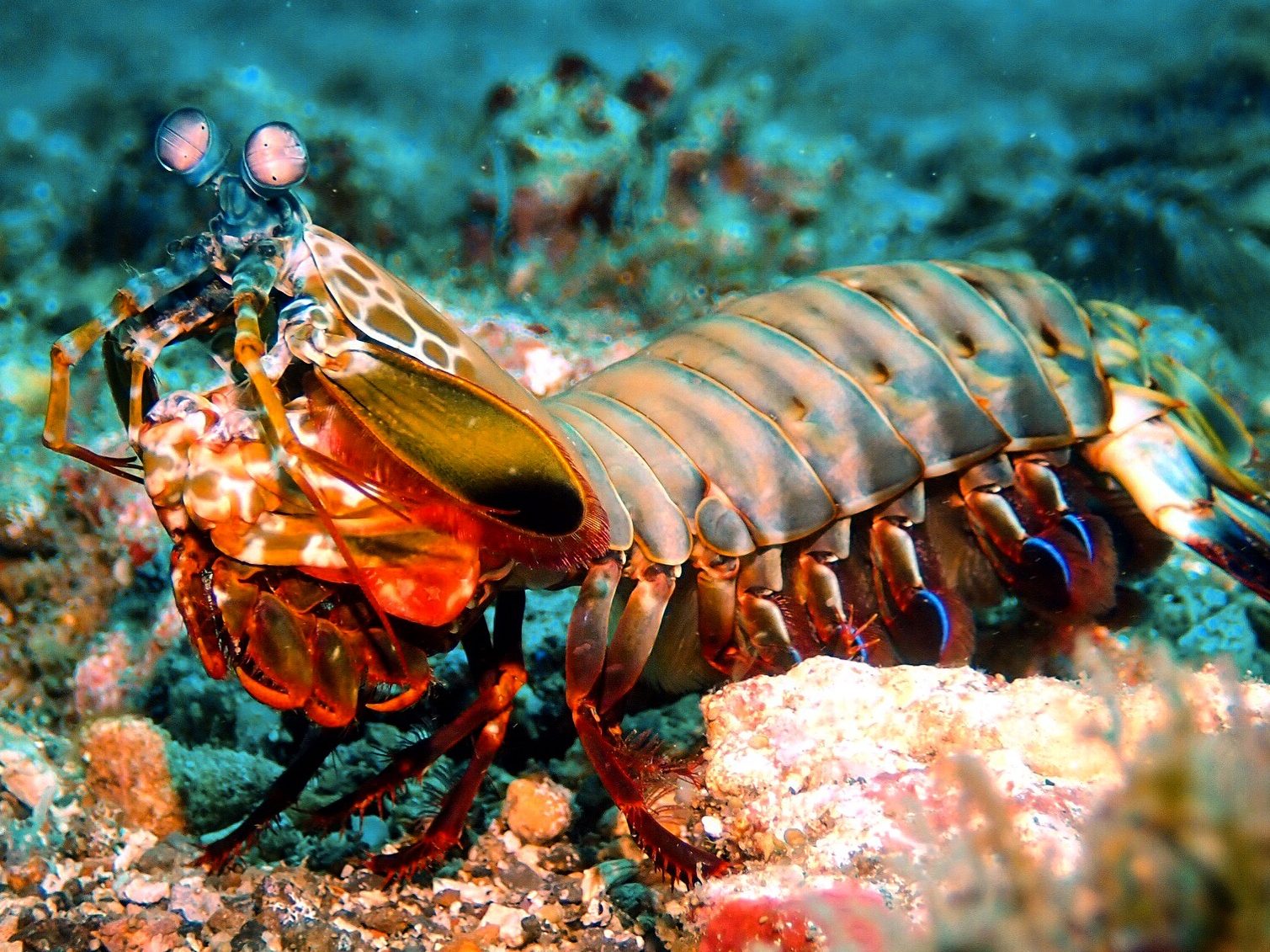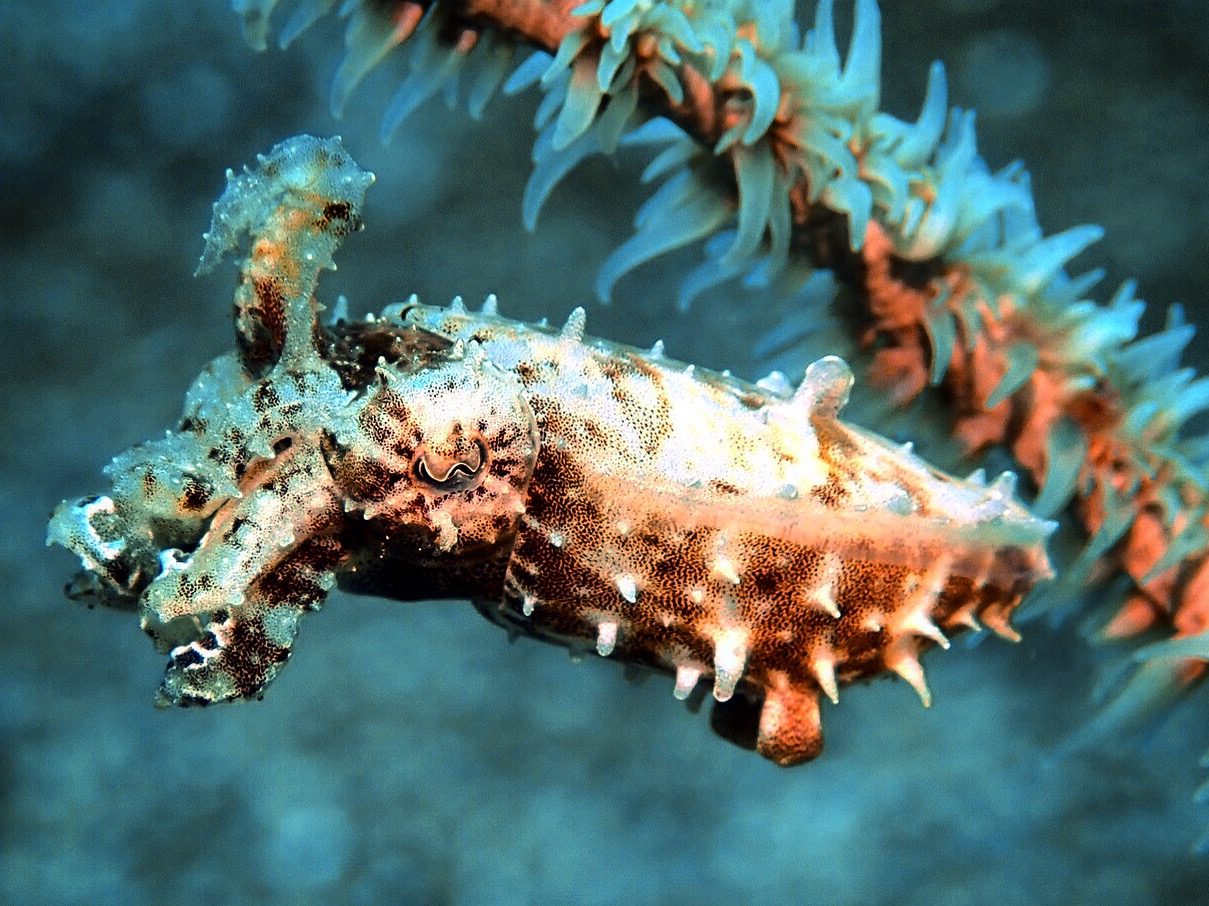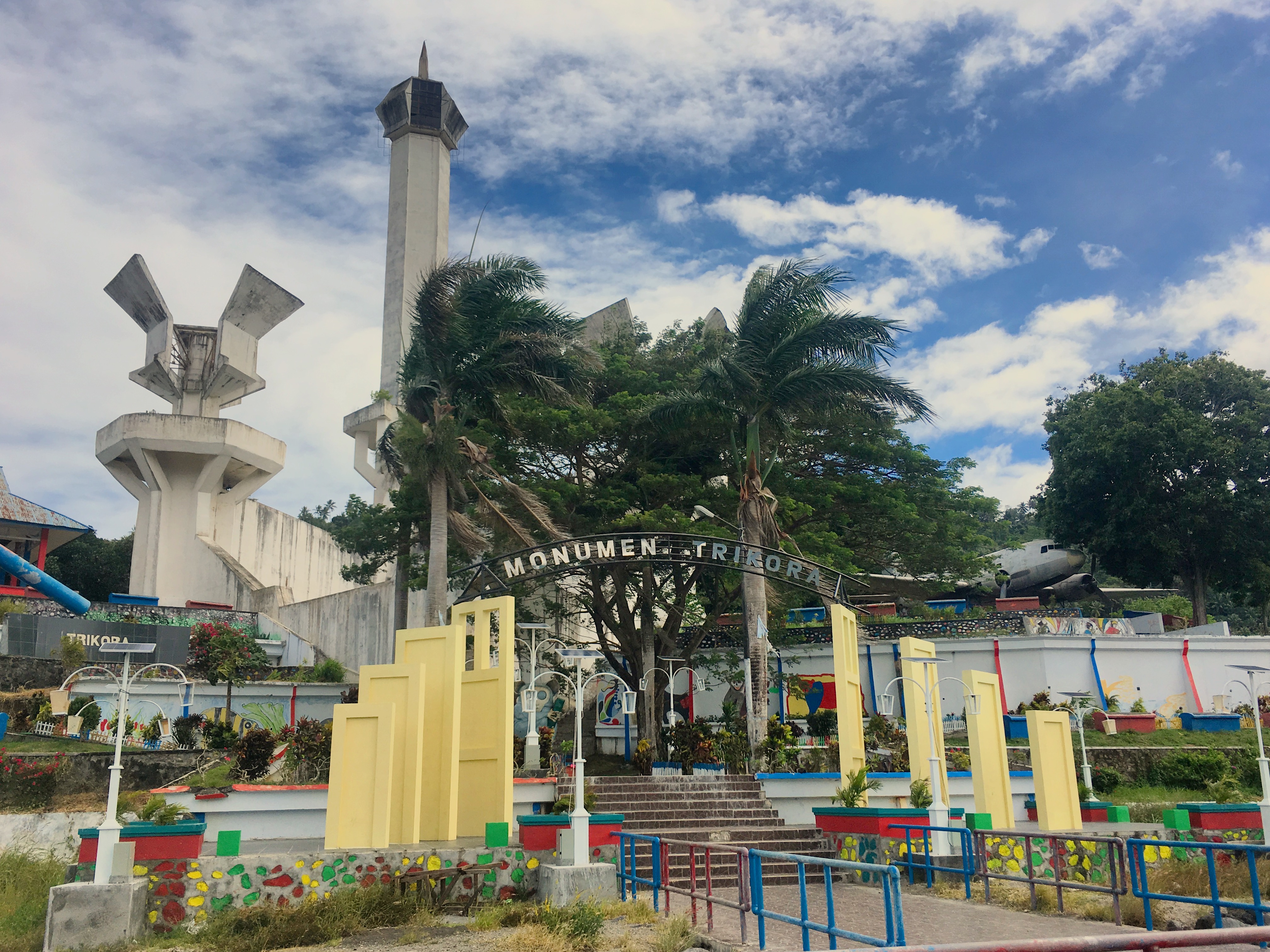
We opted out of diving on our last day in Lembeh, Indonesia. We could have squeezed in a last morning dive and still had time to decompress before our flight out of the country, but why push the limits? You may be aware that flying too closely after diving is about the equivalent to your insides as opening up a bottle of soda that has just been dropped down the stairs. I don’t know about you, but I’m not in any great hurry to drink that soda. (The recommended time between diving and flying is 18 hours if you were about to open a new tab to look that up).
So Tanja, Stefan, Fletch, and I signed up for a land tour through the resort. It would be a shame after all, to leave Indonesia without actually having seen any of Indonesia.
I mentioned before that we were staying at a relatively new and small resort, only a year and a half old with nine bungalows, and we were the only guests there for that entire time. As such, there were a few things that we were the lucky firsts to experience. One of these things was the Indonesian snack platter. We ordered this one evening whilst sitting by the pool with drinks. There was much confusion, plus a language barrier; several of the staff intermittently asked what we wanted on it, both Fletch and Tanja tried to ask for whatever it was meant to come with, and we finally ended up with a small bowl of fried veggie fritters, which were tasty but didn’t exactly represent a “platter” worth of food for four people. The next morning we received apologies and an explanation that no one had actually ordered that off the menu in the resort’s year and a half of being open.
The land tour was the next thing that I’m pretty sure no one had ever done before. In fact, at times it felt like no tourist from any of the resorts in Lembeh had ever done anything of the sort before (which you know me, I’m always keen for an adventure away from the normal tourist crowds).
The dive boat ferried us around the corner on our last morning to the neighboring village, where a safari truck picked us up. You may have run into these on your own travels, where a pickup truck has been outfitted with benches in the bed, sometimes a nice little awning. They are very practical and would never pass any safety standards for being on a road in the US.
We huddled into the back along with our Indonesian dive guide and one of the staff girls, then started winding along the dirt roads and up the lush hillsides. I had absolutely no idea that there was so much elevation to be gained in Lembeh, but we were hanging on to the rails to keep from sliding off of the benches and falling out of the truck bed. Our poor dive guide was turning green in the face, which was rather ironic given that he spent his days on boats. I guess sea sickness and car sickness are two different things.
We rumbled past numerous villages, some as big as 400 people, some only a couple shacks on the beach, which our Indonesian comrades got a good laugh out of telling us constituted an entire village. It must have been election season, because many of the villages were waving the flags of their political parties. We descended into one valley, to find a sea of red flags with bulls flying over every home, like a realm from Game of Thrones all waving their house sigils.
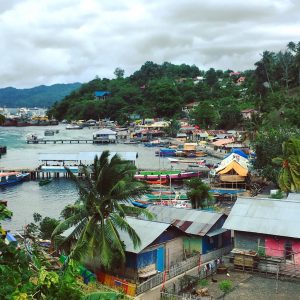 |
| A picturesque village in Lembeh, Indonesia. |
As we made our way around the island of Lembeh, it quickly became apparent that this was not a tourist, or even a highly developed area of Indonesia. There were no cities, no supermarkets, not even any hotels save for the few dive resorts on the Lembeh Strait side of the island. Just lush green jungle and scattered, sleepy villages. Imagine our surprise then, when the vehicle dropped us off at a replica of Brazil’s Christ the Redeemer statue, a replica that was even taller than the original supposedly. Why did this 19 square mile island have a bigger and better version of Brazil’s most famous landmark? I don’t have a clue. I have scoured the internet and nothing is written about it (in English anyway). It was like finding a replica Eiffel Tower in a sleepy little mountain town. We wandered around the deserted statue in puzzled awe for several minutes before heading back to the truck.
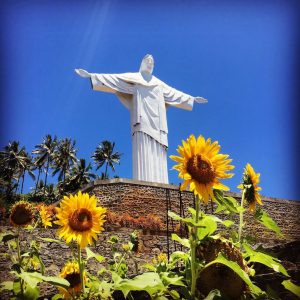 |
| Lembeh’s replica of the Christ the Redeemer statue, which is taller than the one in Brazil. |
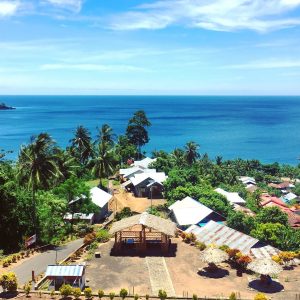 |
| The view from the Christ the Redeemer statue. |
Our next stop was a beach to go snorkeling. There was a long boardwalk to get there, and by boardwalk, I mean individual planks of wood nailed together that looked as though they had been soaking in the high tide and then drying out in the sun a few too many times over the years, and might give way at any moment. The spaces between the boards were wide enough that we had to watch our feet carefully as we walked the perilous path over mangroves.
The beach was mostly coral with lots of driftwood. It looked like a little patch of desert amongst all the jungle, and was a relaxing spot to stop and stare at the sea. Unfortunately we arrived at low tide, and it would have taken a walk halfway out to the horizon and burning to a crisp in the meantime to reach any water deep enough to snorkel. So we sat under a little thatched roof shelter and amused ourselves by watching a black digger wasp digging himself a hole in the sand to use as a trap. It mesmerized us for some time.
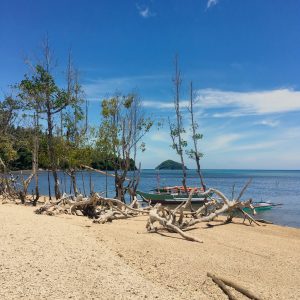 |
| Driftwood on the beach in Lembeh, Indonesia. |
Some more of the Indonesian resort staff arrived out of nowhere, all smiles, eager to join the day’s adventures. Whether they wanted to tag along for the fun of it, or were sent along to take notes for future land tours I’m not sure, but the more the merrier.
With nothing else to do, we got hungry pretty quickly and said, let’s go eat. The original plan for the tour had included the resort’s kitchen packing a picnic lunch for us to eat on the beach, but Fletch had lovingly requested that we go eat somewhere local, knowing I wouldn’t be happy leaving the country until sampling the Indonesian cuisine (and something besides resort food, as good as it was).
I know a lot of people visit Lembeh for the diving, but I was beginning to think that not many tourists before us had ventured out of their resorts, because all of the locals as we got closer to “town” were waving at us and staring at us like we were celebrities. My suspicions were further confirmed when we discovered that there really wasn’t a local restaurant on the island to go to. We pulled up to a roof covering several stalls. A couple of them were miniature convenience stores. Some had fold out tables with buffets of a few dishes set up, covered in tents to keep the flies at bay. A few plastic tables and chairs were crammed into the empty spaces. One of the plastic tables was hurriedly cleared off, and we were told to help ourselves, so help ourselves we did.
The selection was much like the selection we had been served at the first resort: lots of curries, a few meat dishes, a few veggie dishes, and rice. None of the nasi goreng that Fletch had been talking about since Bali. The food was excellent though. There was an eggplant dish that I had to go back for seconds of because the flavors in the sauce were so lovely together with the eggplant. The food outside the tourist realm is always the the most flavorful. I guess there’s a reason they don’t normally serve it to tourists though. Stefan was polite enough to wait until that night to inform us of the maggots hiding at the bottom of his fish.
Tickled at seeing white people dining with the locals, an Indonesian lady a table over was filming us on her smart phone for several minutes as we ate. Tanja was the first one to get up the nerve to ask her to please stop. After lunch, a dude approached us to ask if we’d take a picture with him. We hesitantly agreed, and then he proceeded to pull out his political poster for the red bull party (which I looked up, and represents the Indonesian Democratic Party of Struggle). In unison, we all said ‘No no no!’ I don’t even involve myself with politics in my own country. No way am I supporting an unknown foreign political party in a predominantly Islamic, underdeveloped nation, in an area of the world where corruption runs rampant. That was harsh, but who knows what we would unknowingly be supporting. The man was still happy to put the poster down and take the picture without it, although he did manage to throw up his political gang sign at the last moment. Then the rest of the locals in the little eating area wanted photos as well.
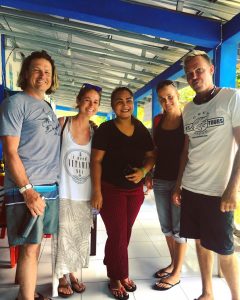 |
| Pretty sure that we were the first white people to eat at this lady’s food stall. |
We crouched back into the truck, and continued down the road to Monumen Trikora, a spot we had dived off of several days before. We had seen mandarin fish under the water, and an old plane on display up the hill. We had absolutely no idea what the place was, and none of our guides knew enough English to explain. We wandered around what looked like a multi-story war monument. The place had not been maintained, and was littered with trash. Sculpted war murals were peeling off the concrete walls, painted murals by school kids were fading, and the area surrounding the plane had turned into a picnic ground for events.
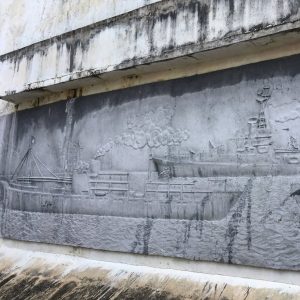 |
| War murals at Monumen Trikora, Lembeh |
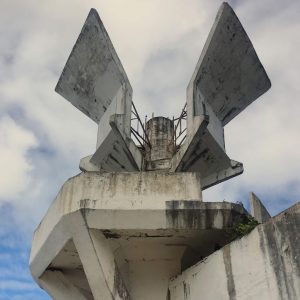 |
| Part of a structure at Monumen Trikora, Lembeh |
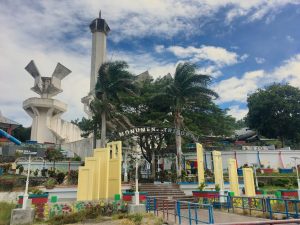 |
| Monumen Trikora, Lembeh |
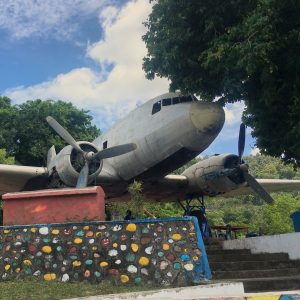 |
| An old war plane on display. |
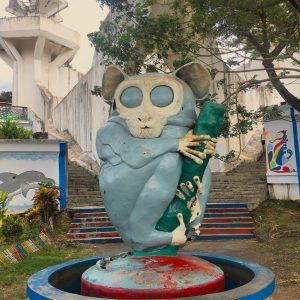 |
| A giant, painted tarsier statue. |
A lady in an official looking uniform approached me with her phone as Fletch and I were staring up at the plane. She didn’t speak any English, but seemed to be asking for something with her phone. Not knowing what else to do, Fletch took a photo of the two of us.
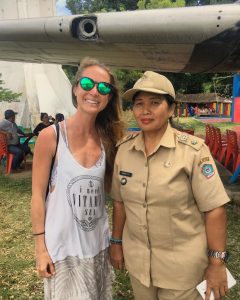 |
| Hope I wasn’t breaking any rules ma’am. Here, have a photo; everyone else seems to want one today. |
After we had wandered around and failed to learn anything about the ruined structures, we returned to the truck which brought us to the village of one of the staff girls. She introduced it as Pintukota Kecil, or “Door to the Small City.” It was a breathtaking little village that looked as though it had been cut out of a cliff. Sheer rock walls surrounded all sides except for the shoreline. The quiet made it feel as though we were stepping on sacred ground, and we moved cautiously as if entering a library.
She lead us over to the church, and allowed us to enter. It had pretty stained glass windows and a ship at the front. Someone outside was planting a garden. She explained that for Easter, everyone in the village would compete to have the nicest garden. We walked down the village to the shoreline where she pointed out a garden on the opposite cliffside. That was hers. I felt like she was showing us something very personal. She lead us through the entire village except to the corner where she lived. Fletch’s joke about meeting her mom must have made the shy girl rethink showing her home to a bunch of foreign strangers.
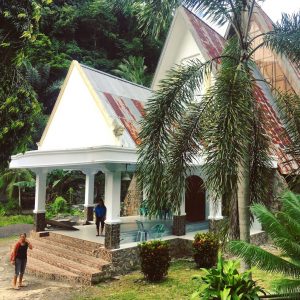 |
| Church in Pintukota Kecil village, Lembeh |
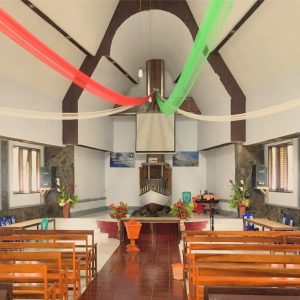 |
| The ship bow at the front of the church. |
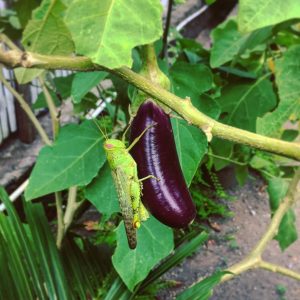 |
| A grasshopper on an eggplant. |
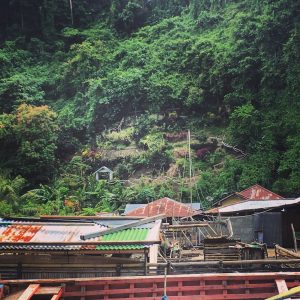 |
| Our guide’s Easter garden on the hillside. |
It was springtime, and all the dogs and cats and chickens had just given birth, and so there were puppies and kittens and chicks happily roaming the entire village. It was a lot of cuteness for such a quiet village, and we stopped many times to play with all the fur babies. It was a little bubble of utopia, this quiet village in the cliffs, cut off from the rest of the world and filled with puppies and kittens. Time seemed to stop there for a moment, and the chaos of the world ceased to exist. It was almost hard to say goodbye when our guide led us back to the truck to bring us back to the resort.
The truck dropped us off a final time, not in the neighboring village but at the top of the hill where the resort was located. We began the trek down the hill and spotted a small snake along the way. The train of local staff behind us simultaneously shrieked and jumped a foot in the air, running frantically back up the hillside, shrieking and laughing at themselves as they went. We all had a good laugh. Luckily Fletch, being a snake person, was able to reassure everyone that it wasn’t dangerous or anything to be afraid of, just a small constrictor. Plus it already had a gecko halfway down its throat, and once down, it is extremely difficult for a snake to spit out what it is eating.
The next morning the four of us donned our field trip t-shirts for one final laugh, and bade the wonderful staff farewell. Thank you to everyone at both Thalassa Dive Resorts for a fantastic vacation! It was fabulous to experience the world’s capital of muck diving, which surpassed all of my expectations, and to finally get our own dive holiday where we weren’t the ones in charge. What a welcome treat!
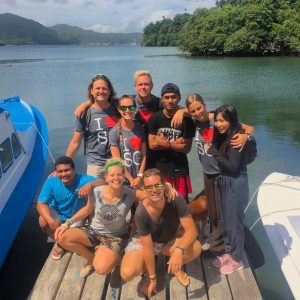 |
| Farewell, Thalassa Dive Resort! |
